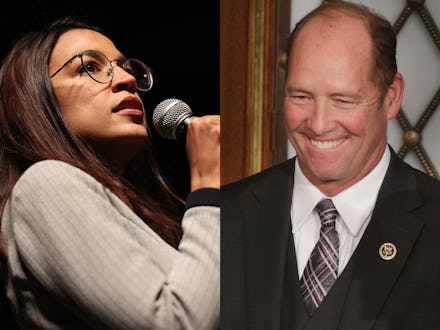Ted Yoho's non-apology to AOC is a prime example of white male victimhood

There's a strong case to be made that 65-year-old Florida Republican Rep. Ted Yoho is the single most flexible person in the whole of Washington, D.C. Less than 24 hours after reportedly calling New York Rep. Alexandria Ocasio-Cortez (D) a "fucking bitch" during a brief argument outside the Capitol Building, Yoho somehow managed to contort an ostensible apology to a colleague into a full-throated defense of his own fragile victimhood.
"I stand before you to address the strife I injected into the already contentious Congress," a rushed, seemingly uncomfortable Yoho began, speaking Wednesday to a nearly empty House chamber. "I rise today to apologize for the abrupt manner of the conversation I had with my colleague from New York."
"It is true that we disagree on policies and visions for America but that does not mean we should be disrespectful," he continued in what was truly a decent start to what should have been an extremely straightforward mea culpa. But instead, Yoho then spent the next few minutes offering excuses, indulging in some self-pity, and thumping his own chest in a caricatured display of martyrdom.
First up, the non-apology, which began with the trite and largely meaningless caveat that being "married for 45 years with two daughters" made him "very cognizant of my language." Yoho denied that he had called Ocasio-Cortez a "fucking bitch," as was reported, and said instead that "the offensive name-calling words attributed to me by the press were never spoken to my colleagues. If they were construed that way, I apologize for the misunderstanding."
It's not entirely clear what Yoho meant with that mealy-mouthed statement. Our best guess: "I never said those things, and anyway, I'm sorry if you heard me say those things, or whatever."
Either way, it was hardly a stirring example of taking responsibility for one's actions — particularly after AOC herself confirmed his language several times on Twitter.
And then it got worse.
Yoho then pivoted to describing the early years of his marriage when, he claimed, he and his wife lived in poverty and relied on food stamps — a point that, while perhaps germane to the initial argument he'd had with Ocasio-Cortez (which was reportedly based on her correct assertion that things like poverty and unemployment help contribute to rising crime rates), seemed in the context of his floor speech to be more an attempt to excuse his having used the language that moments earlier he denied ever using.
And still Yoho kept going, concluding his remarks by stating that he "cannot apologize for my passion, or for loving my god, my family, and my country" — four things no one was asking him to apologize for in the first place, but which he conveniently used to paint himself as a victim, rather than as someone who allegedly accosted a young, Latina, female colleague by yelling obscenities at her in their shared workplace.
There is, in all this, an unmistakable stench of a certain type of old white male victimhood — one characterized by a bizarre sense of indignation at the suggestion that their behavior should merit any sort of criticism or consequences.
Fortunately, for her part, Ocasio-Cortez — who, as a former New York City bartender, almost certainly endured semi-regularly that same form of entitled, obnoxious behavior Yoho displayed both in their initial confrontation Tuesday and during his non-apology Wednesday — pointedly refused to accept Yoho's masterful exercise in dodging any actual responsibility for his actions.
"I will not teach my nieces and young people watching that this an apology, and what they should learn to accept," she tweeted after Yoho's remarks in the House. She pointedly added: "He didn’t even say my name."